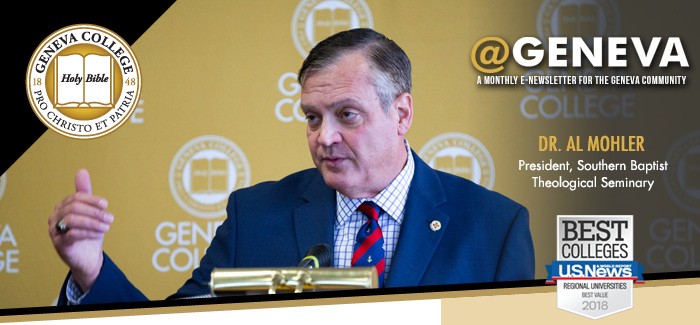Sweet Tea, Small Bites and Truth from Dr. Albert Mohler
Dr. R. Albert Mohler Jr. spoke to pastors, faculty and staff at Geneva College on Friday, May 4 of Commencement Weekend. In an event that featured southern favorites of sweet tea, chicken waffles and other bite-sized snacks, the 120 gathered were nourished by a wise assessment of one of America's top evangelical Christian authorities on culture, morality and the faith.
Mohler is President of The Southern Baptist Theological Seminary, esteemed authority on contemporary issues among evangelical Christians, author, blogger and host of two popular programs, "The Briefing" and "Thinking in Public."
Here are some excerpts from his well-received take on American Christianity and the role of Christian pastors in the world today.
Who defines us?
“To be a Christian, a Biblically defined Christian, means that we do not define ourselves. Not only do we not have an imperative to define ourselves, we don’t have the ability to define ourselves. To be a Christian is to come to the shocking realization that what’s wrong with me is not something that happened to me, it’s me! Rescue can come only from outside.
"To be a Christian is to understand that we are commanded creatures, and by the way just a creature, by definition a creature is commanded by the creator. B.B. Warfield got that right over a hundred years ago when he said, 'If God created the world, then he’s in charge. Period.'
"That’s the Christian worldview in a summary. He made it, it’s His; He made us, we’re His; He defines us. Not only do we not define Him, we don’t get to define ourselves."
What’s happened in our culture and what do we do?
"So, we’re finding out what it’s like on the other side of whatever’s happened (in our culture). And we do need to understand what’s happened; we need to try to understand what’s happened in order to understand our contemporary challenge. But on the other side of this great happening, we really only have three alternatives.
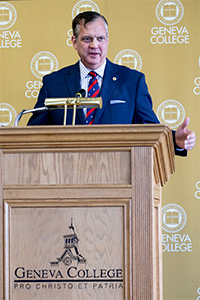
"One of them is resignation. We just simply say, Christianity is exhausted. The Christian Church was a good run for two millennia, but our sell-by date has been reached. We don’t have anything to say. We don’t know anything as true, and it’s time we simply hang it up and move on.
"The second option is revisionism. We want to hold on to the smells and the bells; we’d like to keep the buildings and the pipe organs and the steeples, and we’d like to keep, especially, the retirement plans and the pensions. And we’d like to hold meaning. That’s part of this whole late-modern myth—you can have meaning without truth. We want to have meaning. Mystery. And we like the fellowship that comes with people seeking meaning together, so mainline Protestantism is just the revisionism of Christianity. Daniel Patrick Moynihan, you may recall the U.S. senator, in a different context used to speak about 'defining deviancy down.' Well, we’ve just been defining transcendence down, and liberal Protestantism until now it’s not just part of the culture, but it’s in so many churches that God’s just a hobby.
"The third option is recovery. And the Christian Church has faced this kind of question before: What do you do in the aftermath of 'blank?' What do you do when there’s nothing else to do but be the church? What do you do when it turns out the culture is not going to help you one bit? What do you do when you’ve got to turn to the New Testament and figure out that we’re actually told what to do?
"So here we are. Resignation is just unfaithfulness. It’s just not an option. And it’s not an option, not because we’re trying to save the church. It’s not an option because we don’t have any alternative. It’s not an option because God does exist! And He has spoken, and Jesus saves. So, there’s no resignation.
"And revisionism, you would think that even if you knew that it was wrong in principle, but you might be tempted to think it would work in practice. You would think the 20th century would be that great refutation. All the liberal Protestants who said the way to succeed and thrive in a post-Christian age is to look post-Christian. How has that worked out for them? But of course, the bigger problem’s in principle: the Christian faith is not given to us for our revision. It is a faith once for all delivered to the saints.
"But then we arrive at recovery, and we ask how would recovery come? And then we look to the Old Testament and the New, and recovery comes only one way. That is by the preaching of God’s word. It never comes any other way. It’s not going to come by some kind of effort to orchestrate a revival. We do pray for a revival, but we can’t orchestrate it. There’s no secret sauce. And we are given to the primal sin of evangelicalism, which is pragmatism. Maybe we just rebrand and get some marketing experts in, and they can help us out.”
“That’s the Christian worldview in a summary. He made it, it’s His; He made us, we’re His; He defines us. Not only do we not define Him, we don’t get to define ourselves.”
― Dr. Albert Mohler
What does it mean to be the children of light when we’re seen as the children of darkness, at least by many of the cultural elites in this country and the academic elites?
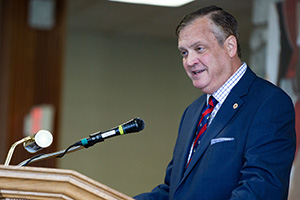 "I’ve been invited to some amazing places where it’s a National Geographic moment, I understand that—it’s as if in bringing me in they have brought in someone from an exotic tribe, in which there really are these people called 'Christians,' and some of them can speak in sentences, and we will ask one of these tribal leaders to come and try explain to us his tribe. They’re very sweet people. "I’ve been invited to some amazing places where it’s a National Geographic moment, I understand that—it’s as if in bringing me in they have brought in someone from an exotic tribe, in which there really are these people called 'Christians,' and some of them can speak in sentences, and we will ask one of these tribal leaders to come and try explain to us his tribe. They’re very sweet people.
"And this is very, very interesting until you get to the issues that really explain why the meeting is really happening in the first place: How can you possibly believe? And you can just finish that sentence a thousand different ways: How can you possibly believe? Because when they come to the conclusion that we really do believe—and they’re coming to that conclusion because we are paying a price in cultural capital to believe, and to be public and clear about those beliefs, to preach the word in season and out of season. It no longer gains us cultural favor - it costs us—then they’re just asking, 'How could you possibly believe that?'
"And, of course, that throws us back on having to get to the very heart of the issues of the most crucial importance: We actually do believe that God exists. We actually do. And not only that, we believe that He is not silent, that He speaks, we believe that He has spoken, that He has spoken in creation, we believe that He has spoken in His word, most importantly, for our everyday lives. We actually believe in the verbal inspiration of scripture.”
“(T)hey come to the conclusion that we really do believe—and they’re coming to that conclusion because we are paying a price in cultural capital to believe, and to be public and clear about those beliefs, to preach the word in season and out of season. It no longer gains us cultural favor - it costs us.”
― Dr. Albert Mohler
From where did our adolescents and young adults get their moralistic, therapeutic deism?
“We also recognize the flimsy nature of what we thought was Christianity. Insincere, artificial Christianity that shapes so much of American culture.
"Now, how could this happen to Christianity? That’s where I think we should pay much attention to Christian Smith’s work over the last several years, when he has looked at successive phases in the lives of young Christians. And as he began when they were in adolescence, and then in emerging adulthood—and of course the problem with emerging adulthood is that adults didn’t emerge—this delayed adolescence, and this very late entry into adulthood. He’s been asking the question 'Why?' with a team of researchers (as they studied) over 3,000 supposedly Christian teenagers. They discovered that their actual religious faith was what he called 'moralistic, therapeutic deism.'
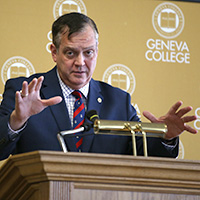 "When it came right down to it, all they really believed was that yes, there is a moral code that they should follow, and we are obligated to a moral code, and conscience is an indicator of what that moral code should be, and when there is a violation of that moral code. "When it came right down to it, all they really believed was that yes, there is a moral code that they should follow, and we are obligated to a moral code, and conscience is an indicator of what that moral code should be, and when there is a violation of that moral code.
"And then therapeutic – and, boy, is this a message that has caught on. Something’s wrong with us, and whatever it is can be fixed with therapy. Whatever’s wrong with us is something that happened to us that someone else can fix or help us to fix. As we’re about the project of inventing ourselves, a bit of therapy will be enough to solve whatever problem we have.
"And then deism. It’s not that most teenagers or young adults are atheists, it’s just that they’re deists. They actually believe there’s a god – it’s kind of reflexive to believe there’s a god. And besides that, agnosticism is exhausting, and atheism requires an actual argument. They don’t even feel the necessity of an argument; they’re not going to exhaust themselves with agnosticism. God exists, but He doesn’t have anything to do with my life on a daily basis.
"And so Christian Smith asked a question, and this is what we need to hear: Where did those adolescents and young adults who didn’t become adults or became adults late, where did they get that moralistic, therapeutic deism? And the answer is from their parents and from their churches. That’s where they got it. Cultural Christianity, nominal Christianity, civil religion. The kind of Christianity that Will Herzberg thought was essential to the American project and the Protestant, Catholic, Jew. It turns out that the Christianity part of that wasn’t very Christian.
"You fast forward to 2018, and here we are. We are fewer than we once were. I think that’s fair to say. It’s not just the mainline Protestant denominations given to theological liberalism that have been in retreat; it’s now evangelicalism experiencing the same kind of reduction in number and the same kind of generational issues. And why? Because to identify with us now requires young people to lose friends, to become decidedly uncool, to have to hold to a worldview that is oppositional to just about everything they know and every cultural message they receive from every cultural authority they know.”
An encouraging word for pastors
 "But if you preach the word, and the word produces a people, as the word does produce a people, they are Christ’s people. The amazing thing about preaching is we’re not just telling people things. I love Luther for so many reasons, but Luther said it so wonderfully in one of his Invocavit sermons when he said to his own seminarians, look, here’s the deal, your job is extremely limited, but necessary, and you are incompetent to do what your people need, you’re just competent to do what you’re called to do. Because what your people need is Christ, and all you get to do is preach. So, Luther said, here’s what you do. You preach the word, and your responsibility is to get the word from your mouth to their ears, and then only the Holy Spirit can do what the Holy Spirit does, which is to take the word from their ears to their hearts. There, he said to his students, you cannot go. That is the Holy Spirit’s work, and He will not share it with the preacher. But if you don’t preach the word, it doesn’t get to their ears. If it doesn’t get to their ears, the Holy Spirit will not apply it to their hearts. "But if you preach the word, and the word produces a people, as the word does produce a people, they are Christ’s people. The amazing thing about preaching is we’re not just telling people things. I love Luther for so many reasons, but Luther said it so wonderfully in one of his Invocavit sermons when he said to his own seminarians, look, here’s the deal, your job is extremely limited, but necessary, and you are incompetent to do what your people need, you’re just competent to do what you’re called to do. Because what your people need is Christ, and all you get to do is preach. So, Luther said, here’s what you do. You preach the word, and your responsibility is to get the word from your mouth to their ears, and then only the Holy Spirit can do what the Holy Spirit does, which is to take the word from their ears to their hearts. There, he said to his students, you cannot go. That is the Holy Spirit’s work, and He will not share it with the preacher. But if you don’t preach the word, it doesn’t get to their ears. If it doesn’t get to their ears, the Holy Spirit will not apply it to their hearts.
"And so I just want to encourage you to say you’re not doing a lesser thing than you signed up for, you’re doing a greater thing than you knew when you answered the call to ministry. You’re producing a Christ-formed people, and they will have an influence. They may not have vast political influence. They may think sometimes they do, and it’s not unimportant. But at the end of the day, every political victory can be reversed quicker than it happens. So, I don’t know any better way to put it than to say, I think we’re stuck with what Paul said to Timothy. We don’t have III Timothy in which Paul said, 'Oh, and by the way, here’s the marketing plan.' We’re stuck with 'preach the word in season and out of season,' and by the time you look at the end of II Timothy 3 and the beginning of II Timothy 4, what’s astounding is what he said the word does. And because of what the word does, what preaching does. And all I have to do is look at that list and realize—that’s what I want to happen. That’s what I believe has to happen, and evidently the way it happens is through the preaching of God’s word."
From the Geneva Blog:
Riches do not profit in the day of wrath...
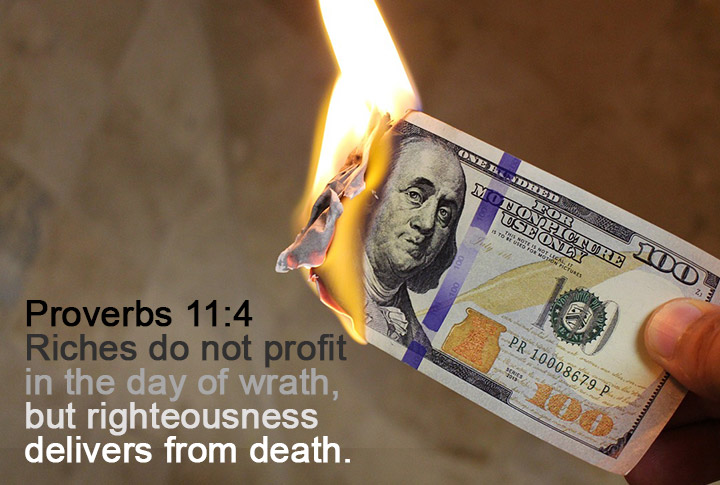
In Psalm 90, as Moses meditates on life’s shortness, he asks God, “Who considers the power of your anger, and your wrath according to the fear of you (Psalm 90:11)?” Death is the debt owed to God’s justice, not to nature. Since God made man in His image, to be loved and to love forever, death is not “a part of life,” as materialists prattle, attempting to quiet their own fears. Because of sin, death unnaturally ends life, so that since sin entered the world, “It is appointed unto man once to die and after that the judgment (Hebrews 9:27).”
When one stands before God’s appointed judge (Acts 17:31), riches will not help. In this life, riches command respect, buy the best lawyers, and may even bribe the judge. But in the day of wrath, riches will not sway the Judge, nor remove the sting of God’s wrath. The only help in the day of wrath is righteousness. More...
|
